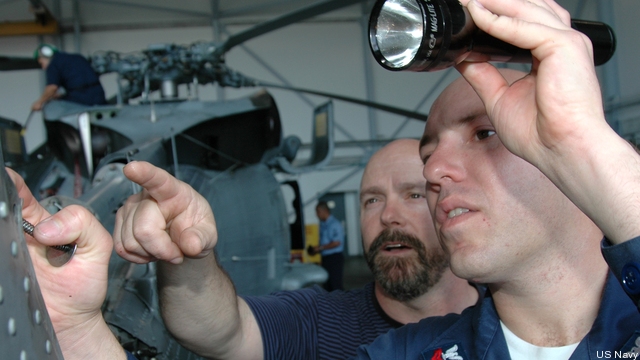This Is Going To Hurt, Acquisition Brass Warn At Sea-Air-Space
Posted on

This is going to hurt. That’s the grim message to defense contractors and federal workers alike from top acquisitions brass in the Navy, Marine Corps, and Coast Guard who convened at the Navy League’s Sea-Air-Space conference this morning to discuss the new “era of austerity.” Pressure to cut costs coming from the highest levels, as with the Administration’s recent cancellation of the Block 30 Global Hawk. As that pain rolls downhill from the service secretaries, the flag officers who run the acquisitions commands are going to tighten centralized control over both industry and their own subordinates in order to double-check every penny.
“We talked here about central control,” said Vice Admiral Kevin McCoy, who oversees shipbuilding as chief of Naval Sea Systems Command (NAVSEA). “When we went and looked at service contracts across NAVSEA — 40-plus field activities issuing contracts — [we found that] we’ve gotten away from central control and central standards.” So McCoy recently issued “red lines” restricting his subordinates’ ability to spend taxpayer dollars. “If you want to issue a one-bid contract, you’re going to come to Bryan Persons [NAVSEA’s civilian executive director] and myself and explain,” said McCoy. “If you want to hire somebody that’s an exorbitant fee… you’re going to come to Bryan Persons and myself.”
McCoy is hardly alone in tightening the reins. “We basically no longer have the resources to let each command or each program office optimize their organization at the expense of the fleet or the larger Navy,” said Rear Admiral Patrick Brady, head of Space And Naval Warfare Systems Command (SPAWAR). What kind of problems of coordination is Brady talking about? “What hurts my soul as a taxpayer,” he said, “is if I deliver a ship and then I’m going to pay somebody to rip off systems the fleet doesn’t want so I can pay a third guy to put on systems” that the fleet actually needs. So, Brady argued, “we need to develop a governance model that controls the number of decentralized decisions.”
The new order also “requires that we have accountability down to the individual for our money decisions,” Brady said. When money is miss-spent, Brady wants to know “who authorized [that]?” he said. “Who decided that’s where we want to go?”
That doesn’t sound like a fun work environment for federal employees. “It’s natural when we’re in this kind of an environment for your people to hunker down,” warned one retired Navy captain, speaking from the audience. “The tendency [is to think] if I don’t do anything, I won’t make a mistake… [That] can result in paralysis.”
“There is some stress associated with doing with less, not only with our work force but also with our operational forces,” acknowledged Brig. Gen. Frank Kelley, chief of Marine Corps Systems Command, who said he frankly expects some of his people to burn out and quit. But Kelley and his colleagues think the federal workforce as a whole is up to to the challenge, he said: “They’re like ‘bring it on. I want to be held accountable.'”
That focus on accountability for current performance carries over to contractors too. “A lot of people like to come and talk to me about their great new idea” for the future of the force, said VADM McCoy. But, he warned contractors, what matters is the work you’re doing now, not just on big programs but on low-profile service contracts. “Make sure first and foremost that on the programs that we are paying you for [already] that you are executing on cost, schedule, and quality,” he said. Things need to perform as advertised on delivery, he said, citing the “hundreds and hundreds of workarounds” required to get Aegis fire-control software to function as an example of what’s now unacceptable.
“All of you [in industry] need to look very hard at your rates, your cost structures,” McCoy warned. “We will exercise particularly our clout in terms of being a big buyer in terms of these services to drive down the cost.”
Overall, for both federal workers and private industry, the defense world is moving from an era of “yes, hurry” to one of “no, wait.” A decade of wartime urgency to support front-line troops is coming to an end, even before the war is actually over. Especially in the Marine Corps, “we’ve just come from ten years where we have asked for and gotten more, more, more — support, vehicles com gear — we’ve not had to say no ever,” said Brig. Gen. Kelley. “If you think you’re going to do business the way you’ve done it for the past ten years, think again.”
Edited at 6:00 pm to correct the last name of the commander of Navy Space and Warfare Systems Command, Rear Admiral Patrick Brady; an earlier version of this article misidentified him.
Subscribe to our newsletter
Promotions, new products and sales. Directly to your inbox.
